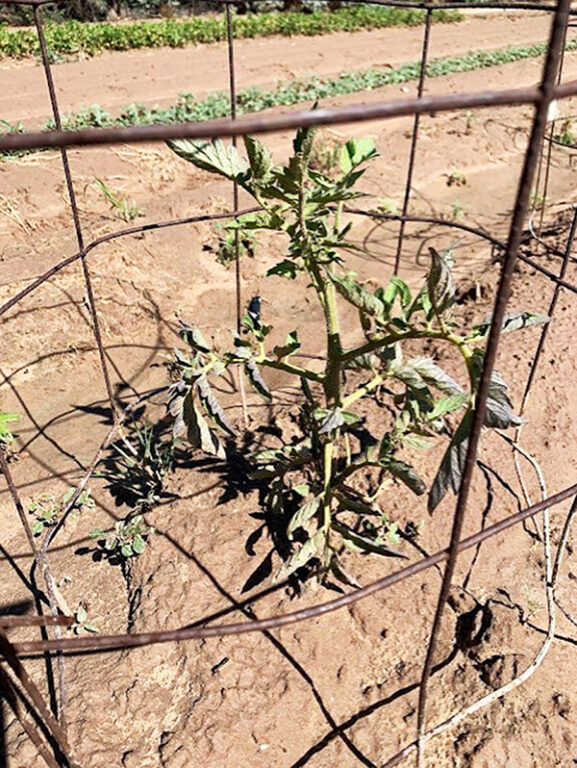
Photo courtesy of New Mexico State University Cooperative Extension Service
More than $560,000 in funding has been awarded to seven New Mexico specialty crop projects for fiscal year 2022-23. One of the projects is New Mexico State University Cooperative Extension Service’s “Protecting New Mexico Chile and Tomato Crops from Disease while Generating Electricity through Agrivoltaics.” Through field experiments on chile and tomato plants grown conventionally and under solar panels, researchers at NMSU Agricultural Science Centers in Las Cruces and Los Lunas will compare curly top virus disease infection rates, as well as plant vigor and yield, to assess the impact of solar panel shade on fruit production. A curly top-infected tomato plant is pictured at the NMSU Agricultural Science Center at Los Lunas.
The New Mexico Department of Agriculture (NMDA) announced that $563,843 in funding has been awarded to seven specialty crop projects for fiscal year 2022-23.
The United States Department of Agriculture’s Agricultural Marketing Service awards the Specialty Crop Block Grant Program funding to NMDA, and NMDA administers the funding, which is awarded to projects that enhance the competitiveness of specialty crops in the state and support specialty crop growers through marketing, education and research.
“With New Mexico being the top chile pepper-producing state in the nation, we look forward to the projects furthering important crop-related research,” said New Mexico Agriculture Secretary Jeff Witte. “Spearheaded by our state’s land-grant university, farmers’ marketing association and nursery and greenhouse association, projects will also address and enhance the importance of food safety, value-chain coordination and education in support of specialty crops.”
One of the research-related project funded, “Protecting New Mexico Chile and Tomato Crops from Disease while Generating Electricity through Agrivoltaics,” involves evaluating the degree of protection against curly top virus infection provided to chile and tomato plants grown under solar panel shading. Agrivoltaics involves the combination of solar panels with agricultural production.
Through field experiments on chile and tomato plants grown conventionally and under solar panels, researchers at NMSU Agricultural Science Centers in Las Cruces and Los Lunas will compare CTV disease infection rates, as well as plant vigor and yield to assess the impact of solar panel shade on fruit production. One of the project’s co-investigators is from the NMSU College of Engineering. Electrical output will also be gauged to estimate potential economic benefits to producers benefiting from less CTV crop loss and electricity generation.
Marisa Thompson, NMSU Extension urban horticulture specialist, said in addition to being excited about researching agrivoltaic opportunities in New Mexico, NMSU researchers are eager to further investigate the effects of shade on CTV infection rates in chile and tomato production.
“Whether they’re farming acres of chiles or just a few plants in the backyard for fun, growers are all too familiar with this virus, which is spread by the beet leafhopper insect vector,” said Thompson. “Curly top is a cute name for a pathogen that is responsible for serious crop losses each season. We are also working to improve agricultural literacy among the general public. Chiles and tomatoes are extremely popular, locally-produced foods that are familiar to a wide audience, not just growers. And if those two yummy headliners don’t grab a person’s attention, maybe solar power integration will.”
Another funded research projects will focus on minimizing the risk of contaminating chile products. The New Mexico State University Food Safety Laboratory plans to work with the New Mexico chile industry to minimize the risk of contamination by pathogenic microorganisms and ensure the safety and quality of chile during production and during the manufacture of value-added products.
Titled, “Training, Testing and Technical Support for Improved Safety and Quality of New Mexico Chile Products,” this project will ultimately benefit chile, onion and pecan growers and processors, as well those who manufacture foods, such as frozen and canned products.
A non-research-related project funded is the New Mexico Farmers’ Marketing Association project, “Expanding Statewide Value Chain Coordination to Grow Specialty Crop Sales and Related Infrastructure.” In this phase-two project, the association will advance the foundational statewide value chain coordination work that began in 2018 to increase sales of, and access to, specialty crops produced by small and midscale growers.
Denise Miller, New Mexico Farmers’ Marketing Association Executive Director, said the new grant allows the association’s value chain coordinator to provide on-farm technical assistance, food safety training and marketing assistance to producers who need help accessing local food markets.
The Valencia County News-Bulletin is a locally owned and operated community newspaper, dedicated to serving Valencia County since 1910 through the highest journalistic and professional business standards. The VCNB is published weekly on Thursdays, including holidays both in print and online.















